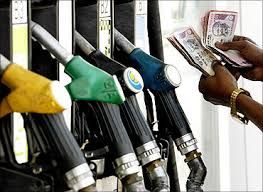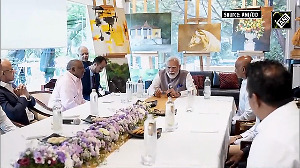The first step in a new policy package has to be that the oil marketing companies are made free to raise and lower prices, in tune with the market, rues TN Ninan
 In the first quarter of 2013, oil (Brent crude) was well over $120 per barrel.
In the first quarter of 2013, oil (Brent crude) was well over $120 per barrel.
By the next quarter, the price was down to $98, only for it to climb back up to $115 a year later. Now the price is down to $102.
Anyone who thinks he can predict where oil prices will go next should recall the forecast by The Economist many moons ago that oil was on its way down from about $10 to $5 per barrel.
That was shortly before the price took off for the stratosphere, and the surge did not stop till the price reached $140 in 2008.
A crash followed in the next year, bringing the price down to less than a third of its earlier level.
So all those who think that ‘good days’ have come on account of falling oil prices should keep their fingers crossed.
That, however, is not an adequate policy prescription, which must hold good during times of low as well as high oil prices.
The government should start with two assumptions: first, that oil prices are fundamentally unstable and susceptible to wide fluctuations, and second, that raising the prices of petroleum products is politically difficult.
The logical response to these two realities is to find a way of ironing out sharp price swings, so that retail price changes at all times are moderated and, therefore, politically feasible.
The operating principle has to be the same as that followed in the case of diesel for the last year and more.
Small, repeated price increases (easily absorbed, as experience has shown) have resulted in a virtual elimination of the diesel subsidy.
The first step in a new policy package has to be that the oil marketing companies are made free to raise and lower prices, in tune with
Petrol is already free, and diesel, too, can now be made free since its subsidy is nominal.
Next, cooking gas prices (used by the top one-third of families, and, therefore, not deserving of any subsidy) should be subjected to the diesel treatment -- small monthly price increases till the subsidy is erased, and then prices freed from government control. The only item to be subsidised then would be kerosene.
Simultaneously, it should be mandated that no increase (or decrease) in any petroleum product price should be more than one per cent a month.
When market prices fall faster than that rate, the oil companies should build a buffer in a new version of the old oil pool account.
They can do this by lowering prices less than the market and putting the difference into the pool account.
Conversely, when prices rise faster than the prescribed rate, they can stick to the one per cent limit on price increases, and dip into the pool account to make good the difference.
Such a policy of getting the oil marketing companies to lose on the swings what they gain on the roundabouts will free them from the vagaries of government pricing decisions, while protecting consumers from sudden price surges.
For good measure, the government will not be burdened with a subsidy on anything other than kerosene, which should be left alone for the time being.
The net gain to the exchequer on subsidies saved would be more than Rs 1 lakh crore (Rs 1 trillion).
Only in the usually brief periods of extreme price surges (1979 or 2008) should a temporary subsidy be considered.
There are a couple of dangers to guard against.
First, the oil account should be kept isolated from government finances, and operated by the oil industry through bank accounts, so that finance ministers can’t dip into the account to make good on Budget numbers.
Second, if private oil marketing companies get into the business, the condition should be imposed on them that they join the pool account and follow its pricing discipline.












 © 2025
© 2025